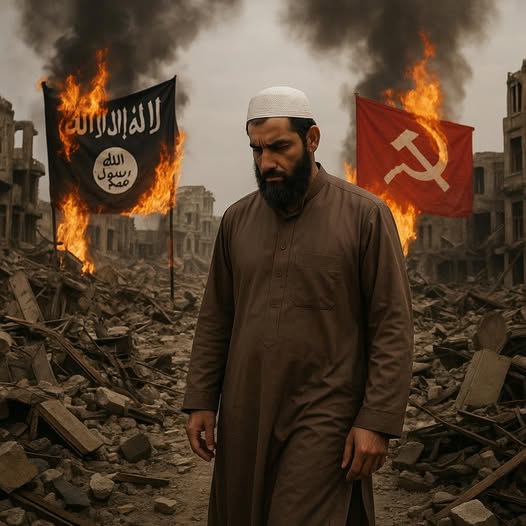The write-up has been submitted by Iqbal Latif. Philosopher | Strategic Observer | Unfiltered Truth.
An Exclusive Interview with Iqbal Latif
Strategic analyst and author of groundbreaking work on nuclear diplomacy, Iqbal Latif blends historical insight with incisive analysis to expose how ideological extremism has crippled Muslim nations. At the same time, pragmatic realism has built enduring power. In this hard-hitting interview, he dissects five decades of strategic triumphs and failures, from Pakistan’s nuclear success to Iran’s ongoing isolation.
Q: Iqbal, Iran’s recent setbacks are global news. How did we get here?
A: Iran’s crisis—strikes on Fordow, exposed defences, a collapsing currency—stems from 45 years of ideological self-destruction. With vast oil reserves, Iran could have been a powerhouse. Instead, it chose pariah status over prosperity, prioritising revolutionary slogans over strategic reality.
Pakistan, by contrast, built nuclear strength while maintaining U.S. ties. One nation thrives; the other faces strikes 70 meters underground. That’s the cost of ideology over pragmatism.
Q: Wasn’t Iran’s revolution a legitimate stand against Western imperialism?
A: The Shah’s oppression fueled the 1979 revolution, but 45 years of economic ruin wasn’t the answer. Iran’s “anti-imperialist” stance impoverished its people, creating more Western dependency than the Shah’s era.
Dilip Doshi, Former Indian Spinner, Dies of Heart Attack in London
Ceasefire That Isn’t? Israel Orders Strikes, Iran Denies Launching Missiles
Fears Over Iran’s Missing 400kg Of Uranium. Enough To Make 10 Nukes, Says US
For more such Opinions & Blogs, click here.
Pakistan resisted Soviet pressure in Afghanistan while preserving Western alliances, securing security and promoting growth. Iran’s defiance left it sanctioned and isolated. The sharp irony: “resistance” weakened the nation it aimed to strengthen.
Q: Was the Iran-Iraq War about defending the revolution?
A: It was ideological madness, not defence. Saddam feared Iran’s Shia revolution; Khomeini sought to export it. Eight years, hundreds of thousands dead, and unchanged borders later, nothing was gained.
The tragic paradox: both sides claimed to defend Islam while orchestrating a Muslim-on-Muslim slaughter unmatched since the Mongol invasions. Ideology betrayed the faith it claimed to protect.
Q: Doesn’t Pakistan’s U.S. alliance compromise its sovereignty?
A: Sovereignty is about results, not rhetoric. Pakistan, with nuclear strength and 250 million people, has never been invaded. Iran’s “pure” sovereignty leaves it vulnerable to strikes.
Pakistan’s alliances built the Muslim world’s only nuclear deterrent. Iran’s defiance couldn’t protect its bunkers. True sovereignty? Saying “no” when it counts—like Pakistan did, downing Indian jets in 2019.
Q: Did Afghanistan’s Taliban defend their honour against U.S. demands?
A: Honour? Twenty years of war, 170,000 dead, and a shattered nation isn’t honour—it’s tragedy. Handing over bin Laden, a foreign terrorist, could have preserved their rule. Instead, they chose “honour” and let millions suffer.
Girl who ‘took responsibility’ for crashing Air India plane in Ahmedabad arrested
Iran Says “Ending Hostilities” After Barrage Of Missiles Kills 7 In Israel
Statement from Israel Government
Pakistan faced similar pressure in 2001, chose pragmatism, and preserved its nuclear arsenal. Afghanistan’s ideological stand made it a graveyard. Which served Islam better?
Q: Is this just urging Muslim nations to bow to Western power?
A: Not bowing—building power smartly. Saudi Arabia aligned with the U.S. and became the wealthiest Muslim nation. UAE embraced pragmatism and built a modern economy. Iran and Syria “resisted” and became rubble.
The incisive truth: nations with vast resources destroy themselves for ideological applause. Does ideology serve the nation, or does the nation serve ideology?
Q: Shouldn’t Muslim nations sacrifice for Palestine’s cause?
A: Sacrifice what? Pakistan struggles with its borders; Iran’s 45-year “sacrifice” brought sanctions, not Palestinian progress. The occupation’s complexities don’t justify self-destruction.
The poignant irony: a prosperous, nuclear-armed Pakistan aids Palestinians more than a crippled Iran. Israel fears Pakistan’s deterrence, not Iran’s proxies. Strategic strength trumps symbolic gestures.
Q: Can’t the OIC foster Muslim unity for collective resistance?
A: Unity? The OIC’s 57 nations clash on priorities—Iran versus Saudi Arabia, Turkey in Syria, Pakistan versus Afghanistan. They demand unity against outsiders while undermining each other.
The stark contradiction: they seek collective defence without economic or military coordination. That’s not unity—it’s delusion.
Q: Is your solution pure realpolitik, abandoning principles?
A: It’s survival first, principles second. Dead nations don’t uphold ideals; thriving ones do. Pakistan’s model—nuclear strength, economic growth, selective battles—works. Don’t court destruction expecting miracles.
The sharp balance: be strong to defend interests, smart to avoid needless fights, and pragmatic to let ideology serve the nation, not enslave it.
Q: Critics say Pakistan’s approach makes it subservient to great powers.
A: Subservient? Pakistan, the only Muslim nuclear power, has avoided invasion, regime change, and economic collapse, despite challenges like debt and instability. Iran, Iraq, Libya, and Syria chose “independence” and faced ruin.
Qatar mediated US-backed ‘ceasefire’ between Israel and Iran
Indian NSA Ajit Doval meets Chinese Foreign Minister, calls for countering terrorism
Trump says Israel-Iran ceasefire now in effect, please do not violate
The incisive reality: perceived subservience beats actual destruction. Pakistan’s “weakness” built nuclear strength; Iran’s “bravery” left bunkers exposed. Survival trumps annihilation.
Q: What lessons should emerging Muslim powers learn?
A: Nationalism beats pan-Islamism, pragmatism trumps ideology, and patience outshines fervour. UAE, Qatar, and Saudi Arabia prospered by prioritising their people, aiding other Muslims. Iran, Syria, and Afghanistan impoverished themselves, helping no one.
The forward-looking truth: you can’t export revolution from a broken economy or defend Islam by weakening Muslim states. Study Pakistan’s nuclear diplomacy, not Iran’s failures.
Q: How should Muslim nations navigate China’s rise?
A: China offers economic growth without ideological strings, yet many Muslim nations fumble it. Turkey criticises Uyghurs while seeking Chinese funds; Malaysia signs Belt and Road deals while questioning Beijing. Iran runs to China only when desperate.
Pakistan’s smarter: we embrace Chinese investment and technology without meddling in their policies. CPEC’s $62 billion infrastructure proves it. [Verify latest CPEC figures.] Moral posturing brings empty rhetoric.
The sharp lesson: choose economics over ideology in a multipolar world.
Q: Do the Abraham Accords mean Arab nations are abandoning Palestine?
A: The Accords trade pan-Arab ideology for pragmatic realism. UAE normalised with Israel and became a tech hub; Gaza’s “purity” brought destruction. Emirates built skyscrapers; Palestinians dug tunnels.
The poignant irony: 75 years of “solidarity” brought neither Arab prosperity nor Palestinian progress. Pragmatic states now wield economic leverage over Israel, while Iran’s $100 billion on proxies couldn’t protect its facilities.
Q: Is Pakistan’s model replicable, or just lucky geography and timing?
A: Lucky? Pakistan navigates a volatile neighbourhood—nuclear India, unstable Afghanistan, proxy-riven Iran. We turned challenges into opportunities: the Soviet-Afghan War built our nuclear program, the War on Terror strengthened Chinese ties, and deterrence balanced India.
Indian govt presses Bangladesh on review of Ganga treaty
Trump announces end to 12-day war as Israel, Iran agree to complete ceasefire
Trump calls Iran’s attack on US bases very weak; 13 of 14 missiles knocked down
Iran, with vast oil and no existential threats in 1979, squandered its advantages on ideological crusades. The incisive truth: smart nations create luck through strategy; others blame fate for self-inflicted wounds.
Q: Is Turkey under Erdogan pragmatic like Pakistan or ideological like Iran?
A: Turkey’s caught between both, losing coherence. Erdogan seeks Ottoman revival while in NATO, critiques the West while craving EU ties, and lectures on Uyghurs while taking Chinese funds.
Pakistan prioritises clear interests: we don’t lecture China or America because their partnerships serve us. Turkey’s contradiction: it wants Muslim leadership without sacrificing Western ties, leaving it neither trusted nor respected.
Q: With AI, cyber warfare, and space tech, are alliances still relevant?
A: More than ever. No nation masters AI, cyber, or space alone. Smart alliances drive progress; ideological isolation ensures obsolescence.
Pakistan pursues AI with China, cybersecurity with allies, and space tech through partnerships, avoiding “Islamic AI” nonsense. Iran’s engineers, stifled by sanctions, show the cost of ideological purity.
The forward-looking reality: technological integration is survival. Pakistan’s alliances are the blueprint for the digital age.
Q: Critics say you ignore legitimate grievances. Isn’t resistance a moral duty?
A: Grievances are real, but resistance must be effective, not performative. Pakistan’s strategic resistance expelled the Soviets and built nuclear strength. Iran’s ideological defiance brought sanctions and strikes.
The moral paradox: effective resistance serves people; performative resistance serves ego. Palestinian resistance, shaped by occupation, needs pragmatic support—like economic leverage from prosperous Arab states—over symbolic martyrdom.
The sharp truth: the highest duty is ensuring your nation’s survival, not chasing applause from those who won’t share your pain.
US President Donald Trump In Situation Room As Iran Attacks US Base In Mid-East
Iran fires missiles at US base in Qatar in payback for strikes; blasts in Doha
Trump asks ‘everyone’ to keep oil prices down
Q: In 25 years, which Muslim nations will thrive or fail?
A: Winners: Pakistan, UAE, Saudi Arabia, Qatar, Bangladesh, Indonesia
They prioritise development, partnerships, and education. They avoid wasteful conflicts while building strength.
Losers: Iran, Syria, Afghanistan under Taliban, if ideological drift persists
They favour ideology over progress, alienate partners, and waste resources.
The incisive pattern: Nations treating religion as faith, not foreign policy, will lead. In 2040, pragmatic Muslim nations will drive global tech, while ideological ones fight old battles—assuming geopolitical stability holds.
The Great Ideological Paradox
Over 56 years, pragmatic Muslim nations built power; ideological ones invited ruin. Iran’s setbacks—facilities struck, defences exposed, economy battered—show the limits of revolutionary defiance. Pakistan’s success—nuclear strength, growing economy, sovereignty intact despite challenges—proves strategic wisdom.
The poignant paradox: nations loudest about defending Islam often weakened Muslim power most, while quiet strength built true deterrence. Ideology without power is elegant suicide; power without ideology is pragmatic survival. Smart nations build strength first, then shape ideology to serve it.
For more such Opinions & Blogs, click here.
NSC reaffirms Iran’s right to self-defense as enshrined in UN Charter
Canada qualify for Men’s T20 World Cup 2026
Israel hits Iran’s N-site, Evin Prison, after Tehran launches ballistic missiles
The write-up has been submitted by Iqbal Latif. Philosopher | Strategic Observer | Unfiltered Truth.
Stay tuned to Baaghi TV for more. Download our app for the latest news, updates & interesting content!






